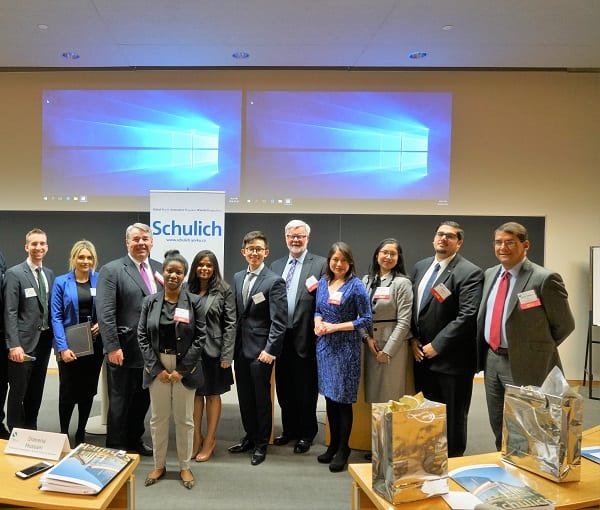Schulich students share infrastructure insights with Peruvian industry officials

All roads led to Peru for Sherena Hussain’s infrastructure students on March 28.
That’s when the Schulich MBA and Master of Real Estate and Infrastructure students pitched their ideas for a public-private partnership to deliver a transportation infrastructure project in the South American nation that is home to part of the Amazon rainforest. On hand to help evaluate and provide expert feedback were a panel of industry professionals that included Peruvian government officials.
The final assignment for Schulich’s Partnership Models for Infrastructure Delivery course, the 21 students were challenged to develop a hypothetical unsolicited bid for a Peruvian transportation infrastructure partnership. The bids were required to identify strategies to attract investment, while also meeting public objectives. Officials from the Peruvian Ministry of Economics and Finance and the Consular General of Peru in Toronto joined a panel of judges from KPMG, WSP and a major Canadian pension plan, to evaluate the student pitches.
The team with the winning proposal, made up of MBA students Mariam Ali and Zachary Weinstock and MREI students Umehani Kanga and Zhengwen Sun, received a $1,500 prize, generously donated by KPMG, which also awarded $1,000 to the second place team and $1,000 to Schulich’s Real Estate and Infrastructure Student Experience Fund.
To address Lima’s growing congestion, pollution, and lack of connected transportation networks, the winning team proposed a partnership that would operate a formal electric bus network to address the last-mile challenges experienced by people living in Peru’s capital city. The proposal balanced best practices from Canada and around the world with public priorities and proposed to enhance Peru’s economic competitiveness, maintain good governance over its infrastructure network, provide safe and reliable public transit, and reduce carbon emissions.
Sherena Hussain, Assistant Professor of Infrastructure, said the idea for the classroom assignment arose while she was researching business models used to deliver infrastructure globally for The Business of Infrastructure, a textbook co-authored with Professor James McKellar, Academic Director of Schulich’s Real Estate and Infrastructure Program, to be published later this year.
“In my discussions with Peruvian policy makers and Canadian firms operating in Peru, I realized that the Peruvian experience could provide an excellent learning opportunity for students,” said Hussain. “The panelist judges were impressed by the students’ ability to apply the concepts they have learned in the classroom to the Peruvian experience in a meaningful way. The infrastructure course is designed to introduce Schulich graduates to core concepts in infrastructure development that can be applied in a way that will help to shape future policy decisions in Canada and on a global scale.”
The proposals were judged by Alvaro Valencia Vera, Counselor, Ministry of Economy and Finance, Peru; Honorable Ana Cécilia Gervasi, Consular General to Peru in Toronto;
Stephen Beatty, Global Head, Infrastructure KPMG; Alan Mitchell, Executive Director, Global Cities, KPMG; Priscilla Adeji, Risk Management Director for a major Canadian pension plan; and Naeem Farooqi, Principal Consultant, WSP.